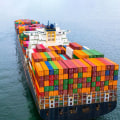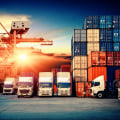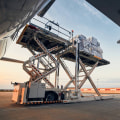Welcome to our comprehensive guide on the differences between countries/regions in international freight forwarding. Whether you are new to the world of customs clearance and regulations or a seasoned importer/exporter, understanding the unique requirements and nuances of different countries and regions is crucial for successful international trade. In this article, we will delve into the various factors that contribute to the differences between countries/regions, and how they impact the import and export regulations. From cultural differences to geographical variations, we will explore it all. To explore your moving options with confidence, get a free quote at newyorkcitymovingservice.com.
So, let's get started and gain a deeper understanding of the complexities involved in international freight forwarding. As the world becomes increasingly interconnected, the need for efficient global shipping and logistics services has grown exponentially. Whether you are a business looking to expand your international operations or an individual moving to a new country, understanding the differences between countries/regions is crucial for successful international freight forwarding. In this article, we will delve into the key factors that differentiate countries/regions in terms of customs clearance, supply chain management, and navigating international trade regulations. By the end, you will have a thorough understanding of how these differences can impact your shipping and logistics needs. To start, let's take a look at customs clearance.
This process involves getting clearance from authorities to bring goods into a country, ensuring they comply with all regulations and paying any necessary duties or taxes. The process can vary greatly from country to country, so it's important to understand the specific requirements of your destination. For example, some countries have strict regulations on certain goods, such as food or pharmaceuticals, which may require additional documentation or permits. It's also important to consider the potential language barriers and cultural differences that may impact the customs clearance process. When it comes to supply chain management, there are also key differences between countries/regions that can impact international freight forwarding.
These differences can include infrastructure, labor costs, transportation options, and technology capabilities. For instance, some countries may have better road networks and ports, making it easier to transport goods domestically and internationally. Others may have lower labor costs, which can affect the overall cost of your shipment. Additionally, understanding the technological capabilities of a country can help you determine the most efficient and cost-effective way to manage your supply chain. Navigating international trade regulations is another crucial aspect of international freight forwarding.
Each country/region has its own set of rules and regulations that govern the import and export of goods, making it essential to do your research before shipping. For example, some countries may have restrictions on certain goods, while others may require specific licenses or permits for certain products. It's also important to consider any potential trade agreements or tariffs that may impact the cost of your shipment. Overall, understanding the differences between countries/regions is crucial for effective international freight forwarding. By considering factors such as customs clearance, supply chain management, and international trade regulations, you can ensure a smooth and successful shipment process.
For more specific information on a particular country/region, it's always best to consult with a reputable freight forwarding company that has experience in that area.
Customs Clearance
When it comes to international freight forwarding, one of the most critical aspects is customs clearance. This process involves the submission of necessary documents and payment of taxes and duties in order to legally import or export goods. However, the specific requirements and procedures for customs clearance can vary greatly between countries/regions. For example, some countries/regions may have stricter regulations and require more detailed documentation for certain types of goods. Others may have longer processing times or require additional inspections before allowing goods to enter or leave their borders.It is essential to understand these differences in order to avoid delays, penalties, or even shipment rejections. Another key difference in customs clearance is the level of automation and technology used in the process. Some countries/regions have advanced systems in place that allow for faster and more efficient processing, while others may rely more on manual paperwork and physical inspections. This can significantly impact the overall speed and cost of shipping. To ensure a smooth customs clearance process, it is crucial to work with a reliable freight forwarding company that has expertise in navigating the specific requirements of different countries/regions. They can help you prepare all necessary documents, stay updated on any changes in regulations, and ensure compliance with all customs procedures. By understanding the process and key differences in customs clearance between countries/regions, you can make informed decisions about your international shipping needs and avoid any potential complications.
Now let's take a look at other important factors that differentiate countries/regions in terms of international freight forwarding.
Supply Chain Management
When it comes to international freight forwarding, managing your global supply chain is a crucial aspect to consider. A supply chain refers to the network of resources and processes involved in the production and distribution of goods. In the context of international shipping, this includes sourcing materials, manufacturing, transportation, and distribution. One of the main considerations for managing your global supply chain is understanding the differences between countries/regions. Each country/region has its own unique infrastructure, laws, and regulations that can impact your supply chain operations.This includes differences in transportation infrastructure, customs procedures, and trade policies. Additionally, cultural differences and language barriers can also play a significant role in supply chain management. It is important to research and understand the business practices and customs of the countries/regions you are working with in order to effectively manage your supply chain. Another important consideration is maintaining efficient communication and coordination with all parties involved in your supply chain. This includes suppliers, manufacturers, carriers, and distributors. Clear communication and collaboration are essential for ensuring timely and successful delivery of goods. In order to effectively manage your global supply chain, it is also important to have a contingency plan in place.
This means having alternative routes or suppliers in case of unforeseen events such as natural disasters or political instability. By considering these factors and understanding the differences between countries/regions, you can better manage your global supply chain and ensure smooth international freight forwarding operations.
Navigating International Trade Regulations
One of the key aspects of international freight forwarding is navigating trade regulations. These regulations can vary significantly from country to country, making it crucial for businesses and individuals to understand and comply with them. Here are some tips to ensure compliance and efficiency when dealing with international trade regulations:- Research the regulations: Before shipping goods or moving to a new country, it's important to research the trade regulations of that particular country. This will give you a better understanding of what is allowed and what is not, helping you avoid any potential delays or penalties.
- Partner with a knowledgeable freight forwarder: Freight forwarders are experts in navigating international trade regulations and can help you ensure compliance. It's important to choose a freight forwarder with experience and knowledge in the specific countries/regions you will be shipping to or from.
- Stay up-to-date with changes: Trade regulations are constantly evolving, so it's crucial to stay updated on any changes that may affect your shipments.
This can include changes in tariffs, restrictions, or paperwork requirements.
- Properly label and document your shipments: It's essential to accurately label and document your shipments according to the specific trade regulations of each country/region. This will help prevent any delays or issues with customs clearance.
By staying informed and working with experienced professionals, you can ensure that your goods are delivered safely and efficiently to their destination.


